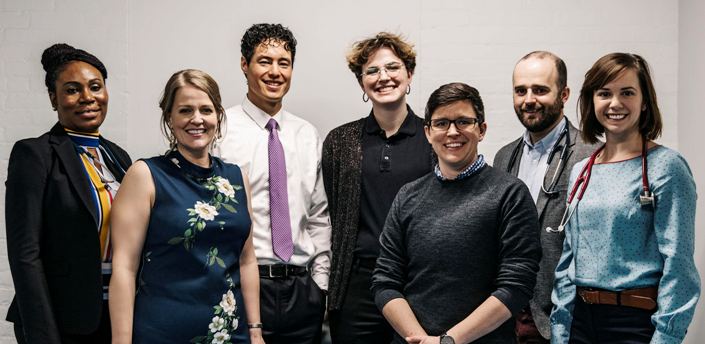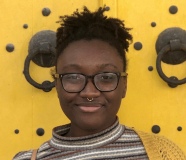 Open Door Health, a graduate of SEG’s 2018 Incubator, utilizes a healthcare approach that is gender-affirming and works to diminish the power imbalance present in many doctor-patient interactions. As a new business — they opened their clinic doors this past March — they have been operating at a precarious point in time but have responded innovatively to the challenges that the COVID-19 pandemic has presented. We recently talked with Emily Adams, a nurse practitioner for Open Door Health (at right above), about the importance of the healthcare services they are offering, especially for marginalized populations in Rhode Island.
Open Door Health, a graduate of SEG’s 2018 Incubator, utilizes a healthcare approach that is gender-affirming and works to diminish the power imbalance present in many doctor-patient interactions. As a new business — they opened their clinic doors this past March — they have been operating at a precarious point in time but have responded innovatively to the challenges that the COVID-19 pandemic has presented. We recently talked with Emily Adams, a nurse practitioner for Open Door Health (at right above), about the importance of the healthcare services they are offering, especially for marginalized populations in Rhode Island.
Melissa Pineda Brown: How would you describe the mission of Open Door Health?
Emily Adams: At the core of our mission is providing high quality, culturally sensitive health care to LGBTQ+ folks, recognizing that we’re the first LGBTQ-dedicated clinic in Rhode Island. Rather than have LGBTQ+ care be an add-on, we make sure that it is central in the way we document, the way we talk, and the way we address health, because we do see how sex and gender minorities are marginalized, especially in health care systems, where their outcomes can be worse. From the moment they walk in our door to when they leave, whether it’s the phlebotomist, the front desk, the care provider, all of us all have the same goal and mission, which is to improve health outcomes and be listening to and serving the community the way they really want and need.
“Gender-affirming care and the informed-consent model are focused on the idea that nobody has to prove themselves — you don’t have to come in and prove you’re trans enough. You don’t have to say I’ve lived in this body, in this life, for so much time.”
MPB: What were you doing before Open Door Health and what led you there?
EA: I’m a pediatric nurse practitioner. I was trained at Hasbro Children’s Hospital’s Gender and Sexual Health clinic, so my focus became gender-affirming care for pediatric adolescents and young adults. That includes social, medical, and legal affirmation, helping families and kids navigate these systems, talking about hormones and blockers, and helping caregivers use their child’s name and pronouns. I really fell in love with this type of consent-based care — how we collaborate with our patients and make sure we’re not gatekeeping but are truly facilitators of health and education.
Before I was a nurse practitioner, I did Teach for America in New Orleans and taught high school math. Even when I was teaching, I wanted to think about how I could raise up the voices of students and empower them. And so I try to bring that into care and model that for parents and caregivers.
MPB: What services does Open Door Health offer?
EA: We have an amazing staff, and I’m grateful to work with people whose values are so aligned. In addition to gender-affirming care, we offer primary care, HIV prevention, HIV care, HEP C care and treatment, and screening and treatment of sexually transmitted diseases. This includes expertise in HIV, PrEP and PEP (pre-exposure prophylaxis and post-exposure prophylaxis). All of us at Open Door Health have been working with the LGBTQ+ community for a long time, and that’s what brought us together. We are an initiative of the Rhode Island Public Health Institute and we benefit from their public health research and policy work.
MPB: Could you go into more detail about how exactly you deliver gender-affirming care?
EA: Gender-affirming care and the informed-consent model are focused on the idea that nobody has to prove themselves — you don’t have to come in and prove you’re trans enough. You don’t have to say I’ve lived in this body, in this life, for so much time. At the beginning of the appointment, I talk about our approach. I always introduce myself and my pronouns. And then I ask, What is your goal? What do you need from me today? I gather a lot of information during the intake interview — allergies, past medical history, social history. When I ask about more sensitive information, like substance use, mental health, and sexual health, I remind patients that they can choose not to disclose, that not everybody wants to talk about every aspect of their sexual experience at every health care visit. And that’s okay. I also reassure patients that I care about their safety and wellbeing. If somebody is having a really hard time with mental health, then we are going to make a plan together and make sure that we’re able to move forward.
MPB: How do you go about decreasing power dynamics when you are giving care?
EA: In terms of decreasing power dynamics, it’s about trying to ask, What do you need? It’s about understanding what the patient is bringing into the appointment and then, at the end, really checking to make sure, Does this plan meet your goals? Do you feel good about it? Do you know what our next steps are? And being transparent about some of my thinking — this is why we’re not doing an x-ray or this is why we’re going to wait to do this lab work. I want them to know I’m thinking about this and I do take their concerns very seriously.
MPB: What obstacles have your clients confronted in accessing healthcare?
EA: I actually used to have a lot of patients come to see me and not realize we can start hormones the same day. For so long, there’s been so much gatekeeping around hormones — that you have to have a therapist sign off or a psychiatrist sign off. I don’t know if you’ve navigated these services, but those are very hard services to access, especially right now. And it helps that I’ve worked with so many folks and I’ve done so much gender-affirming care that I feel really confident in being able to prescribe and talk about it with patients. Finding providers who are also able to do this model of care does require work — education, keeping up to date, being in touch with other people in the network — to really provide the highest-quality care.
MPB: What obstacles do you believe your patients face in general?
EA: Fear for their safety if they begin their affirmation process and their experience in the world. Especially trans women and trans women of color are at the highest risk for violence. And so recognizing that their safety can be a big barrier and something that is going to have to be part of the discussion and their lived experience, is really hard. And then we think too about the bigger issue, right? That we see higher rates of suicidality, self-harm, homelessness, and substance use, and this is not because there’s an intrinsic problem. It’s because of minority stress and the bigger picture about how society is marginalizing these communities.
MPB: How have you ensured that your services cater to the needs of the LGBTQ+ community in Rhode Island?
EA: We have a community board that represents the people we’re serving. One thing I really appreciated when I joined Open Door Health was that it is not about outsiders saying this is what you need, but about making sure people have a voice in the direction of their healthcare and what we do and making sure our staff is also representative of the people we serve. And that’s always a goal. Offering gender-affirming care has been a really central piece, and we also do a lot of PrEP, PEP and STI testing. We offer onsite phlebotomy services so people do not have to go to another lab site where we don’t know how they will be treated, or if they will be stigmatized. We love the community we’re part of, and having open, honest communication with our patients about their health and needs.
MPB: How do you go about destigmatizing HIV and STI?
EA: One of our goals is to be a positive presence in our community, and also a place where people can come together and meet and be part of ongoing community activism. It’s been a little hard with COVID-19. But I think just asking about sexual health, and being able to treat HIV and STIs and being knowledgeable about them, can make patients feel safer in talking about HIV and sexual health with us.
MPB: What was the reason Open Door Health participated in SEG’s Incubator program, and what did you learn?
EA: We wanted to learn about how to apply business principles to our work as a nonprofit. The skills we gained from being in the SEG Incubator have really helped us serve our clients and patients. Since we opened in March, we have served 425 patients for in-clinic care.
“We like to say we’re small but mighty. And we are huge dreamers. We want to do it all.”
MPB: How has Open Door Health responded to the COVID-19 crisis, and what have the challenges been?
EA: Well, you know, our name is Open Door Health! We don’t want to close doors. But we had to think about the safety of our patients and our staff. So it was really hard to navigate in the beginning of the pandemic. We opened March 1 and very quickly realized that it was going to dramatically impact how we were building our clinic and our work. We ended up doing all online telemedicine for April and May and then reopened in June. We needed to determine if telemedicine would be covered by health insurance, and also think about how to manage flow in-clinic to reduce risk to staff and patients while there were not assurances at the federal or state level about how to do this. We also started our COVID testing site in June and had to figure out how to scale up quickly because there was such a demand.
MPB: Can you share any future plans or initiatives that Open Door Health has envisioned?
EA: We like to say we’re small but mighty. And we are huge dreamers. We want to do it all. We see a huge need for behavioral health. So we’re thinking about how to get therapists and psychiatrists onsite so we can do same day needs. We also definitely see a need in our immediate community for substance use programs. We want to make sure we have the social supports in place and the structures to really make sure no one slips through the cracks. And so those are all things that we’re very excited about. Eventually we want to provide all the care our patients need and to be as accessible as possible.
By Melissa Pineda Brown
SEG Community Outreach & Communications VISTA

